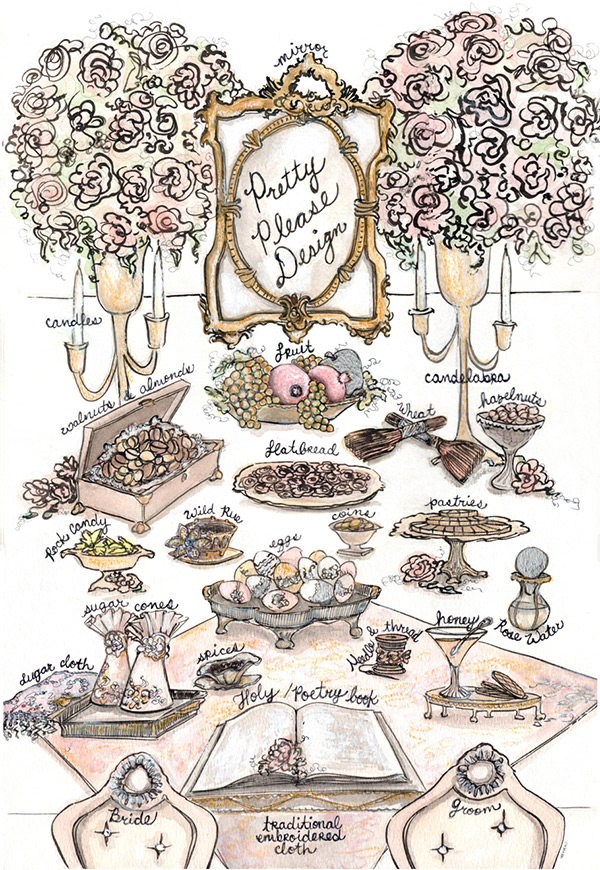Sofrehaghd
The sofreh aghd is a traditional wedding ceremony spread where legal marriage + ceremonial traditions are exchanged. The ceremonial traditions have been practiced for thousands of years + sofreh aghd spreads are usually very customary at Persian weddings. Like most, Iranians have diverse religious backgrounds and the sofreh aghd is a chosen cultural ceremony commonly practiced regardless of faith. There are many symbolic items in which make up the sofreh aghd spread, all in which represent an element of the couple’s new life + marriage together. The word “sofreh” means “spread” and “aghd” means “ceremony.
While most aim to keep the traditional elements of the sofreh design, each sofreh is unique in its own + designed around the bride + groom's style. Every sofreh aghd design has traditional must haves, however based on the taste + budget of the couple some sofreh designs are more elaborate + intricate than others + some may be more simple + understated than others.
Below is a visual guideline + list of some of the traditional pretties that make up the sofreh aghd:

While most aim to keep the traditional elements of the sofreh design, each sofreh is unique in its own + designed around the bride + groom's style. Every sofreh aghd design has traditional must haves, however based on the taste + budget of the couple some sofreh designs are more elaborate + intricate than others + some may be more simple + understated than others.
Below is a visual guideline + list of some of the traditional pretties that make up the sofreh aghd:

Unauthorized use and/or duplication of this illustration without express and
written permission from Pretty Please Design is strictly prohibited.
(Digital Millennium Copyright Act: http://tinyurl.com/893fs9)
(Digital Millennium Copyright Act: http://tinyurl.com/893fs9)
-
AYEENEH {Mirror}
Represents bringing light + brightness into the future for the married couple. Traditionally the couple look into the mirror together. -
SHAMDOON {Candles/candelabras}
Symbolize energy + clarity in the couple’s life together. -
KHONCHEH {Assortment of seven symbolic herbs + spices}
An assortment of herbs + spices are placed on the spread to guard against the evil eye. The seven herbs + spices include: poppy seeds “khash-khaash”, wild rice “berenj”, angelica “sabzi khoshk”, salt “namak”, nigella seeds “raziyaneh”, black tea “chai” + frankincense “kondor”. -
NOON SANGAK {Flatbread}
A decorative display of flatbread “noon-eh-sangak” symbolizes prosperity for the feasts + couple’s life together. It can be accompanied with feta cheese “noon-o-panir” + fresh herbs. -
TOKHMEH MORGH {Eggs}
Represent fertility for the couple. -
BADOOM, GANDOM, o GERDOO {Almond, walnut, + hazelnut}
Also symbolize fertility + abundance. -
MEEVEH {Seasonal fruits}
Usually pomegranates + apples. They represent a joyous future. -
SHAHKHEH NABAT {Rock candy}
Prettified to symbolize a sweetened life for the newlyweds. -
SEKKEH {Coins}
Are place on the sofreh spread to represent wealth + prosperity for the couple. -
ASAL {Honey}
Consumed right as the ceremony is going to conclude. The bride + groom exchange hands (usually with the pinky) dipped in the honey + shared off the hand to represent sweetness for the couple’s life. -
GOLAAB {Rose water}
Is used to perfume the air.
-
HOLY BOOK OF CHOICE {Koran, Bible or a book of poetry such as Hafez}
Placed on the sofreh aghd to symbolize God’s blessing for the couple. The book is usually opened from the middle + placed on the spread in front of the couple as a symbol of faith. -
SHEEREENI {Sweets + pastries}
Are placed on the sofreh aghd + to be shared with the guests after the ceremony concludes. Sheereeni symbolizes the sweetness of life. -
TOOREH GHAND {Sugar cloth}
A fine fabric which is held over the couple’s head throughout the ceremony by various happily married female relatives + friends. -
KALEH GHAND {Sugar cones}
Is used during the ceremony over the couple’s head. Happily married woman rub the sugar cones together over the “ghand cloth” while held over the couple’s head to shower their life + marriage with sweetness. -
ESFAND {Wild rue}
Is an herb which is burned as part of a ritual (in the coal brazier) + tradition for purification. It doesn’t always have to be burned + can be used as decorative display. -
SOOZAN NAKH {Needle + thread}
Symbolizes the ritual of two people becoming one. Symbolizes two families becoming one. -
MANGHAL {A coal brazier}
Is used to burn wild rue (esphand) to drive away negativity + anything evil. -
TRADITIONAL PERSIAN EMBROIDERED CLOTH {Termeh}
A traditional Persian silk or embroidered cloth handed down from generation to generation to symbolize family + tradition. It is used as a decorative display amongst the rest of the traditional items. -
SOFREH OVERLAY {Ceremonial cloth}
Is the spread used under all of the traditional sofreh items. -
MOKHADDEH {Bride + groom’s seating}
Usually stools or some sort of cushion seating for the bride + groom to sit on during the ceremony exchange.

